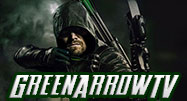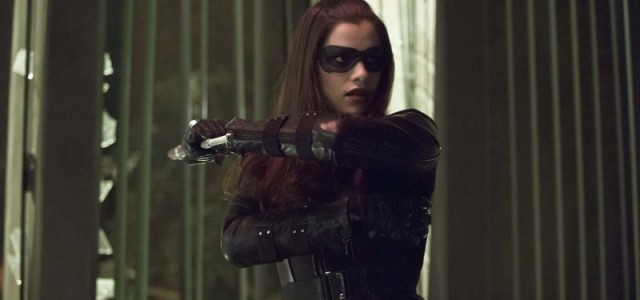
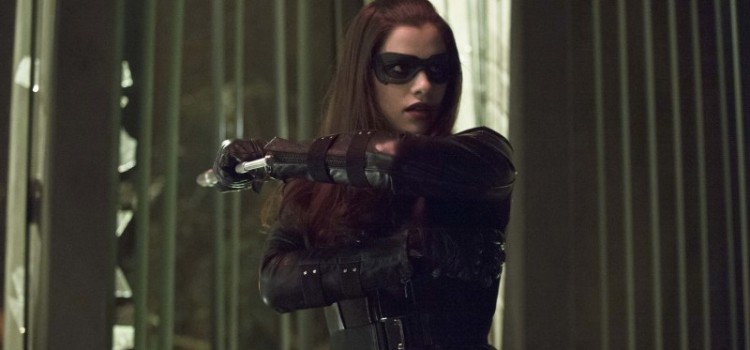
Arrow #2.17: “Birds of Prey” Recap & Review
Recaps & Reviews April 2, 2014 Matt Tucker

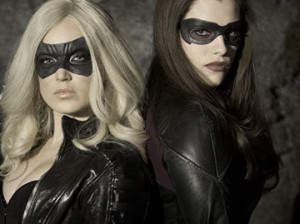 Summary: The capper to the Huntress’ introduction arc offers an effective gauge of where characters are heading into the final act of the season.
Summary: The capper to the Huntress’ introduction arc offers an effective gauge of where characters are heading into the final act of the season.
If you have not seen this episode yet and do not wish to be spoiled, do not continue reading!
Recap
While keeping an eye on Quentin Lance during a bust, the Arrow and Canary aid in the capture of fugitive mob boss Frank Bertinelli. Now caught, it’s but a matter of time before Frank’s daughter, Helena, returns to town to finally kill her father. Adam Donner squares things with the Bar Association for Laurel and hires her back to try Bertinelli’s case. However, it’s a set-up, employed to draw Helena out and capture both Bertinellis. When Helena attempts to kill Frank at the courthouse, Oliver intervenes, getting Frank to safety, but leaving Laurel to be held hostage with others. Sara breaks into the courthouse as Canary to rescue Laurel, convincing her at one point to not toss her sobriety away again. Laurel insists they help the other hostages, and the resulting confrontation with Helena gets Sara thrown out the window and Laurel captured. Helena leverages Laurel with Oliver to get him to bring Frank to her. At the meet, a rogue SWAT cop tries to take out everyone, killing Frank in the process. Helena and Sara fight and Laurel stops Sara from killing the Huntress. Sara learns she can do things Oliver’s way. Oliver assures a bereft Helena she’s not alone, offering redemption as she’s taken into custody. Laurel blackmails DA Spencer into keeping her job. Oliver has Roy break up with Thea over concern for her safety, which ultimately leads to her being abducted by Slade. On the island, Slade forces Sara to offer up a marine technician to fix the Amazo in exchange for Oliver’s life.
For a full recap of this episode, visit our handy episode guide.
Review
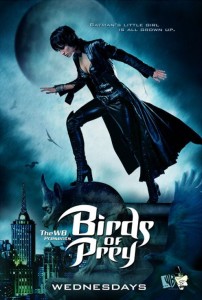 Despite the base excitement engendered by the title — even with the mixed but mostly bad aftertaste of the deeply flawed 2002-03 Birds of Prey TV series — one couldn’t help but be apprehensive about a return visit of Helena Bertinelli. Though her appearances have gotten progressively better, her initial two-episode arc was amongst the low points of the first season. While ‘The Huntress Returns‘ was a significant improvement, the divisive character sat firmly on the Don’t Come Back So Soon list upon leaving Starling City. So it was that the announcement earlier this season of her return was met with as much, if not more, trepidation as enthusiasm.
Despite the base excitement engendered by the title — even with the mixed but mostly bad aftertaste of the deeply flawed 2002-03 Birds of Prey TV series — one couldn’t help but be apprehensive about a return visit of Helena Bertinelli. Though her appearances have gotten progressively better, her initial two-episode arc was amongst the low points of the first season. While ‘The Huntress Returns‘ was a significant improvement, the divisive character sat firmly on the Don’t Come Back So Soon list upon leaving Starling City. So it was that the announcement earlier this season of her return was met with as much, if not more, trepidation as enthusiasm.
One of the criticisms leveled by viewers against the show in this sophomore season is that there are far too many characters with far too many plots. (While I understand the root of that complaint, maybe even slightly sympathize, it’s not one I wholeheartedly share.) Adding Helena back into the mix, especially amidst the just-now-boiling Slade plot, would at first blush seem to exacerbate that concern. However, one intent of the writers in using the Huntress has been as a barometer for other characters, particularly Oliver. It’s here, in ‘Bird of Prey,’ that she’s used most effectively in that regard. She gauges not only where Oliver is in his journey, but also the Sisters Lance in their respective paths. Helena’s story also reflects Roy’s, in a fashion, so her arrival clearly proves beneficial to many of the season’s story arcs.
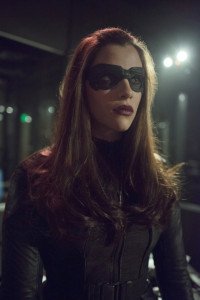 What was quickly wearing itself thin was Helena’s motivation. In fact, we’d already had her leave the city and return specifically to kill her father once he was in custody last year. The thought that they could trot out this circumstance every year was unappealing, specifically with the idea that, at some point, Helena would have to become a redemptive character. This chapter of her arc was organically coming to an end, and it demonstrates again, as many times as we’ve pointed it out, that the showrunners know their plot well. They really had three options with Helena here: have her kill Frank, have her die in her pursuit, or the route they chose with killing Frank not at her hand and Helena recognizing too late the error of her ways. In any case, it brought a necessary resolution and left Helena in a place where it might actually be appealing to see what they do with her next.
What was quickly wearing itself thin was Helena’s motivation. In fact, we’d already had her leave the city and return specifically to kill her father once he was in custody last year. The thought that they could trot out this circumstance every year was unappealing, specifically with the idea that, at some point, Helena would have to become a redemptive character. This chapter of her arc was organically coming to an end, and it demonstrates again, as many times as we’ve pointed it out, that the showrunners know their plot well. They really had three options with Helena here: have her kill Frank, have her die in her pursuit, or the route they chose with killing Frank not at her hand and Helena recognizing too late the error of her ways. In any case, it brought a necessary resolution and left Helena in a place where it might actually be appealing to see what they do with her next.
While it’s been a pressing theme this year just how much Oliver has changed, particularly in his lethal as last resort versus murder modus operandi stance, it’s never really been as potent and fully-woven into the character as much as the denouement scene between Oliver and Helena at the police station following her arrest. It was very obvious back in “Muse of Fire” and “Vendetta” that Oliver taking on someone to mentor was a bad idea so early in his career, specifically because he was still approaching his campaign from a point of revenge. Oliver trying to coach Helena was hypocritical, at best, even if he had the best intentions. That made this shared moment between them all the more poignant. Oliver doesn’t accept his failing with Helena in a “woe is me”/tortured fault way, but genuinely recognizes that he let down this person because of his own failings. Interestingly, he might prove a better mentor now that that blinding driving force has been removed from her life and she’s been imprisoned.
Though, one does have to somewhat question Oliver’s ability to be a mentor to anyone. While his ask of Roy to stop seeing Thea was quite clearly earned, it’s hard to see that he’s offering much positive in Roy’s development. To be fair, the Mirakuru-afflicted mind doesn’t put anyone on an even enough keel to be properly influenced or taught by anyone. Still, Oliver sort of haphazardly using Shado’s training methods doesn’t seem to be providing the right incentive or focus for his young charge, and his own focus being pulled towards Slade and protecting those closest to him doesn’t really foster Oliver’s full attention. At this point, he’s merely containing disaster, and he honestly seems to recognize that. Thea being picked up by Slade at episode’s end, with the obvious intimation that it will become an abduction, doesn’t bode well for Roy’s fragile state of mind. Though, it should be noted that despite his misguided blame of Shado’s death on Oliver fueling his plans, Slade seems far more in control of capacities than he did on the island. That offers insight into Roy’s own future, but can such a similar event send him down his own dark path?
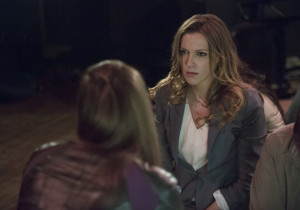 Speaking of dark paths, Laurel’s left in a stranger place by the end of the episode than she was at the start. It remains to be seen what kind of effect Helena’s words about letting the darkness in will have on her long-term, but it was a bit of an odd transition given that she’d finally taken responsibility for her disease and choices. The impression the episode is supposed to leave us with is that Laurel is looking on it as a source of strength, but it reads a slight bit like a backtrack. Thankfully, though, they addressed the ridiculousness of Laurel being offered her position at the DA’s office back right in the narrative, though Donner’s plan seemed thoroughly flawed in conception. If the idea was to set up a sham arraignment and case to draw Helena out, they could just as easily have used someone actually employed in the DA’s office to accomplish the task. Bringing back Laurel was unnecessary and serves to be a rather silly way to make her a practicing lawyer again. One could suppose that Laurel was used merely for fodder in case the lawyer was killed in the crossfire, but it’s a bit of funky plotting for the episode. It also managed to boot Donner out of office, which seems oddly self-aware.
Speaking of dark paths, Laurel’s left in a stranger place by the end of the episode than she was at the start. It remains to be seen what kind of effect Helena’s words about letting the darkness in will have on her long-term, but it was a bit of an odd transition given that she’d finally taken responsibility for her disease and choices. The impression the episode is supposed to leave us with is that Laurel is looking on it as a source of strength, but it reads a slight bit like a backtrack. Thankfully, though, they addressed the ridiculousness of Laurel being offered her position at the DA’s office back right in the narrative, though Donner’s plan seemed thoroughly flawed in conception. If the idea was to set up a sham arraignment and case to draw Helena out, they could just as easily have used someone actually employed in the DA’s office to accomplish the task. Bringing back Laurel was unnecessary and serves to be a rather silly way to make her a practicing lawyer again. One could suppose that Laurel was used merely for fodder in case the lawyer was killed in the crossfire, but it’s a bit of funky plotting for the episode. It also managed to boot Donner out of office, which seems oddly self-aware.
The person most effected by events, aside from Helena, is Sara, fitting given the episode title. Though her inclusion on the show this year was a bit controversial, particularly that she is a fully-formed Black Canary if not in name, she has become an integral part of the narrative. Part of her struggle is that she has been sullied, taken in first by Anthony Ivo and the Amazo with their experiments and then by the League of Assassins to become a killer. Despite working alongside Oliver, she doesn’t see herself as a good person and certainly not doing anything heroic. Oddly, if you look back on her first arrival in Starling City, she was doing some heroic things in the Glades following the Undertaking. Of course, a lot of that was motivated by her wanting to protect Sin. By the same turn, all of her activities as the Canary have been in service of protecting her family. Even this episode, she’s out patroling with the Arrow merely to keep an eye on Officer Lance. Her sole concern with the hostage situation is Laurel’s safety, which made Helena expendable.
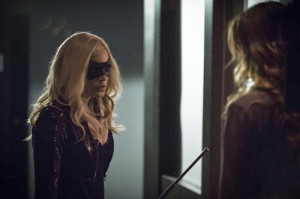 Much like Oliver’s transitions on the island with killing the bird in “An Innocent Man” and with the “castaway” in “Dodger,” Sara ultimately deciding to offer Hendrick up to Slade in exchange for Oliver’s life sat in perfect juxtaposition to her current approach to Helena. She’d already made compromises in the year she was with Ivo, but we begin to see the cold, dark choices she will make for those she cares about. It’s also fitting that Laurel, rather than Oliver, is the one to stop her from killing Helena and shake her from the thought that she must kill all potential threats. As the final battle looms, this could be setting Sara up for redemption before a final fall, a sacrifice in the battle with Slade. Yet, it’s also not a foregone conclusion that Sara’s life will be lost this season, so a chance to bend the Canary onto the path of the hero is just as important to keep her around with Team Arrow.
Much like Oliver’s transitions on the island with killing the bird in “An Innocent Man” and with the “castaway” in “Dodger,” Sara ultimately deciding to offer Hendrick up to Slade in exchange for Oliver’s life sat in perfect juxtaposition to her current approach to Helena. She’d already made compromises in the year she was with Ivo, but we begin to see the cold, dark choices she will make for those she cares about. It’s also fitting that Laurel, rather than Oliver, is the one to stop her from killing Helena and shake her from the thought that she must kill all potential threats. As the final battle looms, this could be setting Sara up for redemption before a final fall, a sacrifice in the battle with Slade. Yet, it’s also not a foregone conclusion that Sara’s life will be lost this season, so a chance to bend the Canary onto the path of the hero is just as important to keep her around with Team Arrow.
Overall, ‘Birds of Prey’ proves a quietly effective episode that helps clearly define where the majority of our characters are on their individual paths. It’s easily the best of the episodes to feature the Huntress, and good credit should be given Jessica De Gouw’s way. Not a fan of her work last season, though witness to the improvement with each episode, I became better impressed with her turn as Mina Murray on NBC’s sadly overlooked (though maddeningly campy, at times) Dracula. That seemed to aid in her return to Helena, and it’s odd to say but further appearances would actually be welcomed. The work between De Gouw and Caity Lotz, De Gouw and Katie Cassidy, and Lotz and Cassidy, all the de facto Birds of Prey for this outing, made for a fascinating and personal episode, evolving each character. Though the less said about the rather poorly shot and edited fight scene between Canary and Huntress at the courthouse the better.
Odds & Ends
- Nice shoutout in the episode to DC Comics writer Gail Simone, the writer most closely associated with the Birds of Prey comic. Once again, it’s a street name thing: Gail St. & Simone
- Another DC call-out, though is Hugo Mannheim supposed to be a cousin or something to Intergang’s Bruno Mannheim?
- Why was Helena continuing to use a mask when absolutely everyone knew who she was? Was it a Christian Bale Batman thing where the beast’s rage is focused in the mask?
- The rationale behind Oliver having Shado’s tattoo is actually something quite exceptional. It’s as much a scar as any other on his body. Bravo to such a development.
- Ever notice how everyone refers to Lance as Detective, even though he was busted back down to street cop? Notice how he also seems to handle scenes like he’s still a detective in charge rather than a beat cop?
- Kudos to the writers for also addressing Oliver calling Roy Speedy out on patrol. During the scene it felt completely out of place. Revealing that it was a way to make Roy think of Thea without using Thea’s name as a way to shake him out of Mirakuru rage was smart, and a clever way to address the name.
- Still baffled as to the healing nature of the Mirakuru if Roy can take a gunshot through the hand at pointblank range and heal within a day or two, but Slade’s eye gets lost to Oliver’s arrow. Perhaps that island confrontation is far more gruesome than we imagine. That or it’s just plain ol’ inconsistency rearing its head.
- Just for the record, the dinner scene from “Vendetta,” referenced by Laurel and Helena here, is still generally considered by most of us here at GATV as the worst scene of the entire series.
A SECOND OPINION
by Derek B. Gayle
Despite being a fairly anticipated episode, “Birds of Prey” has quite a lot stacked against it. This is an episode of a superhero show focused on its main hero’s most prominent girlfriends, a type of story that can quickly devolve into either offensive male fantasy, or a silly story akin to the “Lois Lane vs. Lana Lang” Superman stories of the 1970s. While it’s impressive that the women featured make up less than half of Oliver’s love interest roster (lest we forget Shado, Felicity, McKenna and Isabel), two of these girlfriends are arguably the most problematic characters on the show. Helena and Laurel have been dark spots during their respective runs, and both spend a whole lot of screentime together this week. If the episode didn’t collapse under the weight of Laurel and Helena being annoying or frustrating, surely it would fail at this faux-women’s empowerment stuff, right?
But, while “Birds of Prey” is hardly a perfect hour, it excels where previous Huntress installments failed. Its effectiveness lies less in the women’s relationships with Oliver, and more in how it compares and contrasts the various paths these women have gone on. The icing is that all of these explorations do still paint a better picture of Oliver while he remains mostly in the periphery, but there’s a nice balance between this being Oliver’s show and these women’s stories.
Laurel’s part of the story barely has anything to do with Oliver, actually, with her continuing this season’s introspective journey to finding her own worth in the world. But it still ties into what all three of the main women want: to understand what they have to offer, and what makes them real, worthwhile people. Katie Cassidy doesn’t play the recovering alcoholic bits that well, unfortunately, and her melodramatic reach for a bottle in the middle of a firefight is cringeworthy, but it’s not unjustified. The best part of Laurel’s story is how her big return to the DA’s office turns out to be a sham, and how that revelation in turn fuels her own quest for usefulness. All the women this week are very smart in an anti-television-drama way (Laurel realizing her role in the DA sting, Thea seeing through Roy’s break-up attempts, Helena’s revelation at the end) and it’s much appreciated. In Laurel’s case, she has apparently decided to go on a darker path for the sake of her own benefit, which is a weird direction to take, but one that will surely be more entertaining than recovering alcoholic. It seemed like she’d hit rock bottom before, but apparently we’ve still been careening down and hadn’t even realized it.
And frankly, it ties in well in a backwards sort of way with the other two women in the spotlight. Laurel’s sister Sara is also trying to find her self-worth, but not so much because she feels worthless as she doesn’t feel like one of the good guys. Her costume makes it easy to forget that she was trained by the League of Assassins, a group specifically catered to training killers, not superheroes. And really, her only big beef with Helena comes from the Laurel connection; otherwise, Helena is just another bad guy, one that’s probably killed fewer people than Sara in the grand scheme of things.
In fact, compared to Oliver and Sara, Helena simply hasn’t been a killer all that long, and her sights have always been squarely on her father. This makes it more believable for Helena’s impending turn to the light, and Jessica De Gouw finally turns in a solid performance just in time. That probably has to do with Helena’s character being necessarily simplified for the hour—she’s so consumed by the darkness that she has no goals other than to be a killer. The “darkness” dialogue she dishes out is incredibly clunky, though for once it’s the words themselves rather than De Gouw’s delivery. But she shines in her final scene, which manages the impossible by making Helena actually seem repentant despite how dark her character had gone in the last two appearances. Having her father killed by accident is a smart third option to take; it’s an easy way to end the story, sure, but it’s also a fitting way to keep Huntress in the fray in a new way. The newfound aimlessness Helena carries is a great, even if obvious parallel to Laurel and Sara at the beginning of the episode, pointing out that any journey to fulfillment and self-worth is going to be the rockier, less obvious journey.
Oliver makes progress by realizing the error in his own self-righteousness, identifying his mistakes as a teacher both in the past and present. With Helena, Oliver realizes how unfair it was to compare his type of murder to hers, surely helped by the realization that Sara is as much a killer as Helena is. With Roy, Oliver simply went about training him the wrong way, trying too hard to get Roy to subscribe to Oliver’s way of thinking rather than doing what’s best for Roy. Both of these elements break down the self-worth Oliver might have a bit too much of at times, and Oliver’s ponderings are a clever deconstruction of the “hero creates his own enemy” trope that’s been so prominent with Slade this season.
It’s becoming clear that while the first half of the season focused on Oliver escaping his first season darkness and becoming a better hero, the second half is plunging the people in his life into that darkness. The question now is who can make their way out—like Diggle did last week and Thea is furiously trying to do—and who is teetering on the edge, like Laurel, Sara, and Roy. And with Slade finally making a direct move on Thea, things are bound to keep getting darker.
